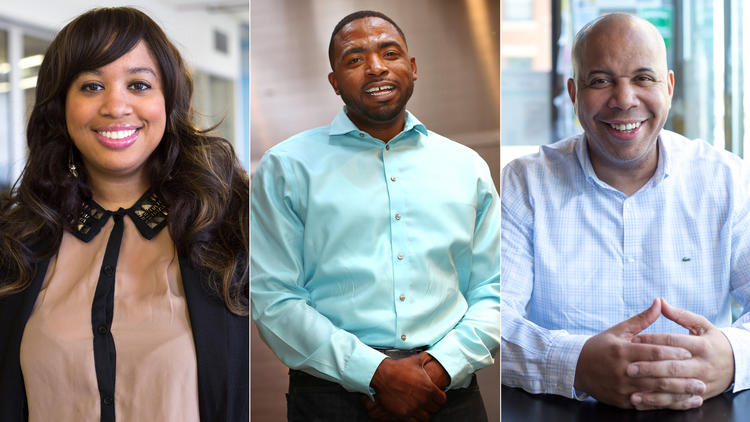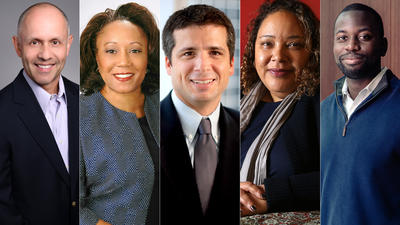When building your business means hiding that it's black-owned

Cheryl V. JacksonBlue Sky Innovation
In growing his patio-installation company, Duane Draughon erased all clues to the public that he, a black man, owned the business.
That meant no photos of him or his family on his website; giving potential customers the impression the business was part of a franchise and that he was a project manager, not the owner; and recruiting a white insurance company representative to conduct job interviews in assembling his white sales team.
The covert tactics helped him to bill more than $6 million over nine years to a white clientele he perceived as racist, as he often encountered potential customers who slammed doors in his face or refused to allow him in their homes, he said.
"I never said I wasn't the owner. If asked, I would admit it. But I always said I was either the project manager or a designer," he said.

Venture capitalists are so white - but what if they weren't?
"Other business owners have reached out to me. I am closing deals. But I'm so used to protecting myself, every time I knock on the door, I do have a fear," he said.
He's even put his photo on his company's website and Facebook page.
That's not a move Chicago tech entrepreneur James Parker is ready to make. He's opted to keep his image out of the promotion of his BestDateNight.com, which offers discounted date outings.
"The idea in any tech startup is to grow it, make a lot of money and dump it for more money," he said. "As soon as you say it's black-owned, white people will believe it's only for black people, and black people will look for something wrong with it."
According to a 2014 Nielsen report on African-American buying habits, 55 percent of blacks with household incomes of at least $50,000 said they would buy or support a product if it was sold or supported by a person of color or minority-owned business. Only 20 percent of non-African Americans in the same income bracket felt the same. The report did not specify the answers of the remaining respondents.
Go Dutch Today is a trio of African-American women, only one of five couples featured on the website for the dating and meeting app is black.
That plays out across all of the team's connection businesses to broaden appeal and help attract investors, said CEO Alysia Sargent.
"At the end of the day, we don't want our brand to be black," said Sargent, a former digital account executive at BET. "Obviously, we want black people to utilize it. However, marketing has to be very broad and multicultural.
"It's kind of unfortunate, but if we want to go further and appeal to venture capitalists and angel investors, we can't just be black."
Pepper Miller, president of The Hunter-Miller Group market research and strategic planning firm in Chicago, said she understands some decisions to downplay black ownership.
"It's not about anybody selling out. People are trying to survive. There's a perception that black people can only do black stuff," said Miller, who began focusing on black consumer marketing when she was denied broader work when starting out in the 1980s.
"It ain't pretty, but it's the truth," she said. "It's called racism. As much as we want to feel like we're not dealing with that, we are."
But Joni Jackson, assistant professor of marketing at Chicago State University, sees little advantage to the tactic and said it encourages a perception of inferiority among black-owned businesses.
"I understand startup businesses might think this is a way to get some traction. But at what point do you reveal that the company is black-owned-and-operated?" Jackson said, "If you're concerned about negative stereotypes that are triggered by associations with that, who's to say they won't be triggered once someone realizes that it is, in fact, a black-owned company?"
Parker said he'll worry about that later.
"I need people to look at the app, and not the app developer yet," said Parker, who is the former operator of a website that promoted black-owned businesses. "After I've milked the opportunities, then I'll come out as CEO."
Cheryl V. Jackson is a freelance writer.
Twitter @cherylvjackson
This story has been updated.
Copyright © 2016, Chicago Tribune
When building your business means hiding that it's black-owned
Cheryl V. JacksonBlue Sky Innovation
In growing his patio-installation company, Duane Draughon erased all clues to the public that he, a black man, owned the business.
That meant no photos of him or his family on his website; giving potential customers the impression the business was part of a franchise and that he was a project manager, not the owner; and recruiting a white insurance company representative to conduct job interviews in assembling his white sales team.
The covert tactics helped him to bill more than $6 million over nine years to a white clientele he perceived as racist, as he often encountered potential customers who slammed doors in his face or refused to allow him in their homes, he said.
"I never said I wasn't the owner. If asked, I would admit it. But I always said I was either the project manager or a designer," he said.
Venture capitalists are so white - but what if they weren't?
"Other business owners have reached out to me. I am closing deals. But I'm so used to protecting myself, every time I knock on the door, I do have a fear," he said.
He's even put his photo on his company's website and Facebook page.
That's not a move Chicago tech entrepreneur James Parker is ready to make. He's opted to keep his image out of the promotion of his BestDateNight.com, which offers discounted date outings.
"The idea in any tech startup is to grow it, make a lot of money and dump it for more money," he said. "As soon as you say it's black-owned, white people will believe it's only for black people, and black people will look for something wrong with it."
According to a 2014 Nielsen report on African-American buying habits, 55 percent of blacks with household incomes of at least $50,000 said they would buy or support a product if it was sold or supported by a person of color or minority-owned business. Only 20 percent of non-African Americans in the same income bracket felt the same. The report did not specify the answers of the remaining respondents.
Go Dutch Today is a trio of African-American women, only one of five couples featured on the website for the dating and meeting app is black.
That plays out across all of the team's connection businesses to broaden appeal and help attract investors, said CEO Alysia Sargent.
"At the end of the day, we don't want our brand to be black," said Sargent, a former digital account executive at BET. "Obviously, we want black people to utilize it. However, marketing has to be very broad and multicultural.
"It's kind of unfortunate, but if we want to go further and appeal to venture capitalists and angel investors, we can't just be black."
Pepper Miller, president of The Hunter-Miller Group market research and strategic planning firm in Chicago, said she understands some decisions to downplay black ownership.
"It's not about anybody selling out. People are trying to survive. There's a perception that black people can only do black stuff," said Miller, who began focusing on black consumer marketing when she was denied broader work when starting out in the 1980s.
"It ain't pretty, but it's the truth," she said. "It's called racism. As much as we want to feel like we're not dealing with that, we are."
But Joni Jackson, assistant professor of marketing at Chicago State University, sees little advantage to the tactic and said it encourages a perception of inferiority among black-owned businesses.
"I understand startup businesses might think this is a way to get some traction. But at what point do you reveal that the company is black-owned-and-operated?" Jackson said, "If you're concerned about negative stereotypes that are triggered by associations with that, who's to say they won't be triggered once someone realizes that it is, in fact, a black-owned company?"
Parker said he'll worry about that later.
"I need people to look at the app, and not the app developer yet," said Parker, who is the former operator of a website that promoted black-owned businesses. "After I've milked the opportunities, then I'll come out as CEO."
Cheryl V. Jackson is a freelance writer.
Twitter @cherylvjackson
This story has been updated.
Copyright © 2016, Chicago Tribune
When building your business means hiding that it's black-owned

